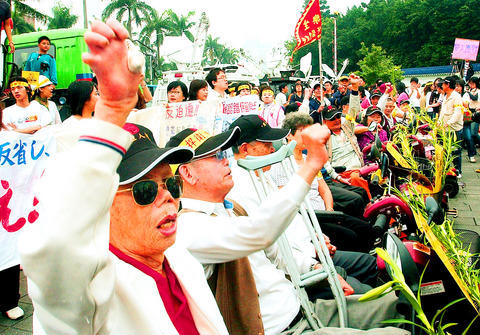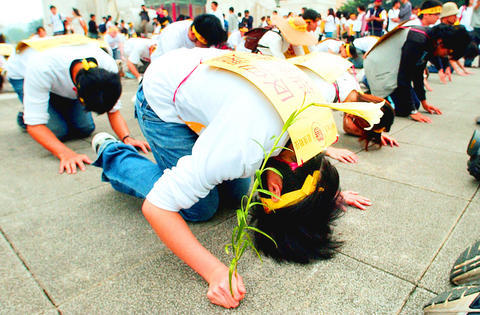Thousands of people took to the streets of Taipei yesterday to support preserving the Losheng (Happy Life) Sanatorium.
After speeches, musical performances and a play by individuals and groups, the crowd marched 2km from the Chiang Kai-shek Memorial Hall to Ketagalan Boulevard in front of the Presidential Office where another rally followed.
Losheng is a sanatorium in Taipei County completed in 1930 under Japanese colonial rule where thousands of people with Hansen's disease, or leprosy, have been secluded for life.

PHOTO: CHIANG YING-YING, AP
Plans to tear down most of the buildings to make room for a Mass Rapid Transport (MRT) maintenance depot have sparked heated debate.
The sanatorium still houses 45 elderly lepers who refuse to move.
Last month, the Taipei County Government announced that today would be the deadline for the residents' mandatory eviction.

PHOTO:CHIANG YING-YING, AP
However, having faced tremendous public pressure, Premier Su Tseng-chang (
Although the premier's decision has given Losheng a temporary reprieve, the sanatorium's future is still uncertain.
"Through the march, we want to put pressure on the government on all levels ? so that Losheng's preservation can be assured," said Hsia Chu-chiu (
A UK-based construction consulting firm has proposed a plan in which 90 percent of the sanatorium's buildings can be preserved with only a few months' delay to the completion of the MRT line.
"Preserve 90 percent of Losheng -- no delay to the MRT" the crowd chanted as they marched.
At the tail end of the march was a group of about 100 "disciplinants," mostly of university students.
Four people leading the team walked while dragging metal barrels with burning coals.
Those who followed kneeled down on the street after every six steps and kowtowed.
"I do so to get a feeling of what it is like to be a disadvantaged person in a society, and to try to feel how hard life was for the elderly people [of Losheng]," said Lou Nai-chieh (樓乃潔), a university student who participated in the disciplinant team.
"I want to thank you all for holding out your hands and offering us your warm help," Chou Fu-tsu (
More than 100 civic groups around the nation participated in the demonstration, according to Hsu Po-jen (
To bring demonstrators from outside of Taipei into the city, the sponsors organized a "Losheng bus" program in which people pooled their money to hire buses.
"There are four buses that brought us here from Kaoshiung and Pingtung," said a demonstrator surnamed Kao from Meinong (
"We're here to join forces with others and express our opposition to a bad decision," Kao said.

CHAOS: Iranians took to the streets playing celebratory music after reports of Khamenei’s death on Saturday, while mourners also gathered in Tehran yesterday Iranian Supreme Leader Ayatollah Ali Khamenei was killed in a major attack on Iran launched by Israel and the US, throwing the future of the Islamic republic into doubt and raising the risk of regional instability. Iranian state television and the state-run IRNA news agency announced the 86-year-old’s death early yesterday. US President Donald Trump said it gave Iranians their “greatest chance” to “take back” their country. The announcements came after a joint US and Israeli aerial bombardment that targeted Iranian military and governmental sites. Trump said the “heavy and pinpoint bombing” would continue through the week or as long

TRUST: The KMT said it respected the US’ timing and considerations, and hoped it would continue to honor its commitments to helping Taiwan bolster its defenses and deterrence US President Donald Trump is delaying a multibillion-dollar arms sale to Taiwan to ensure his visit to Beijing is successful, a New York Times report said. The weapons sales package has stalled in the US Department of State, the report said, citing US officials it did not identify. The White House has told agencies not to push forward ahead of Trump’s meeting with Chinese President Xi Jinping (習近平), it said. The two last month held a phone call to discuss trade and geopolitical flashpoints ahead of the summit. Xi raised the Taiwan issue and urged the US to handle arms sales to

State-run CPC Corp, Taiwan (CPC, 台灣中油) yesterday said that it had confirmed on Saturday night with its liquefied natural gas (LNG) and crude oil suppliers that shipments are proceeding as scheduled and that domestic supplies remain unaffected. The CPC yesterday announced the gasoline and diesel prices will rise by NT$0.2 and NT$0.4 per liter, respectively, starting Monday, citing Middle East tensions and blizzards in the eastern United States. CPC also iterated it has been reducing the proportion of crude oil imports from the Middle East and diversifying its supply sources in the past few years in response to geopolitical risks, expanding

Pro-democracy media tycoon Jimmy Lai’s (黎智英) fraud conviction and prison sentence were yesterday overturned by a Hong Kong court, in a surprise legal decision that comes soon after Lai was jailed for 20 years on a separate national security charge. Judges Jeremy Poon (潘兆初), Anthea Pang (彭寶琴) and Derek Pang (彭偉昌) said in the judgement that they allowed the appeal from Lai, and another defendant in the case, to proceed, as a lower court judge had “erred.” “The Court of Appeal gave them leave to appeal against their conviction, allowed their appeals, quashed the convictions and set aside the sentences,” the judges